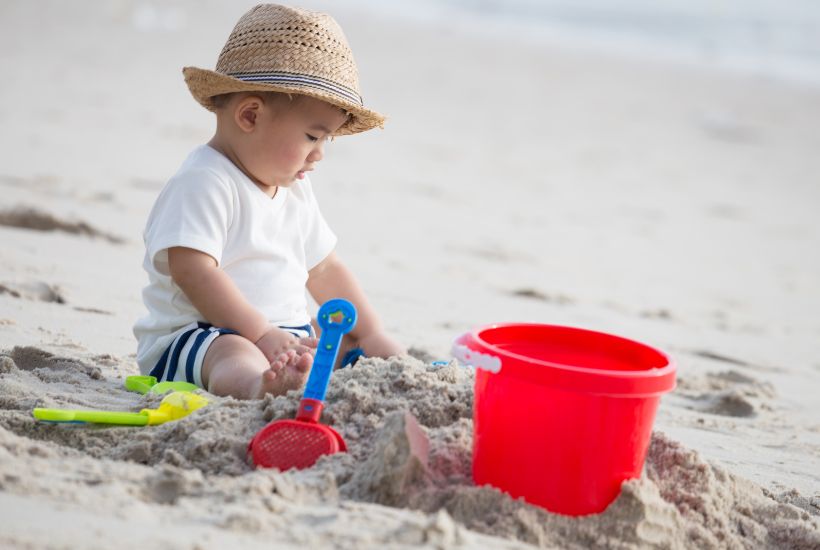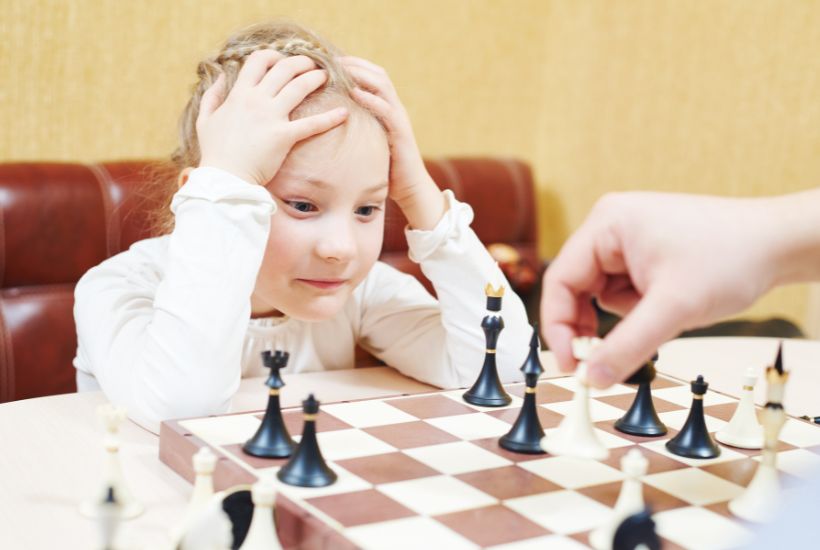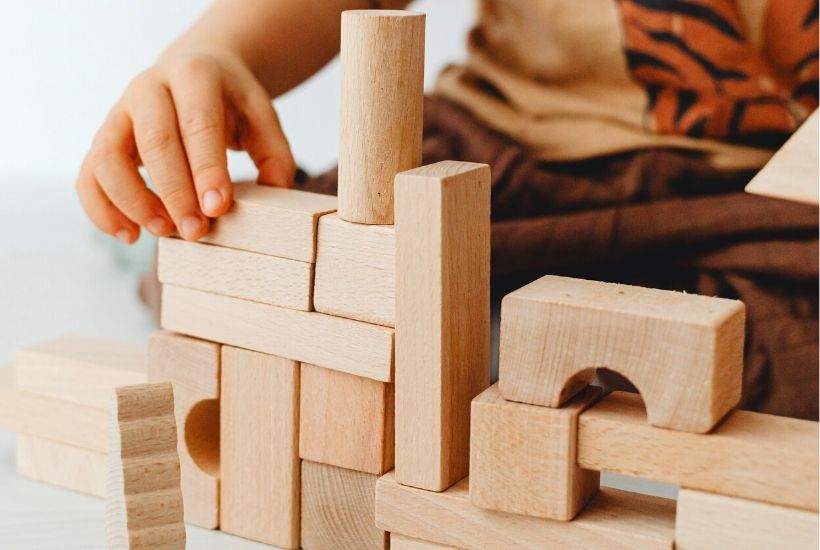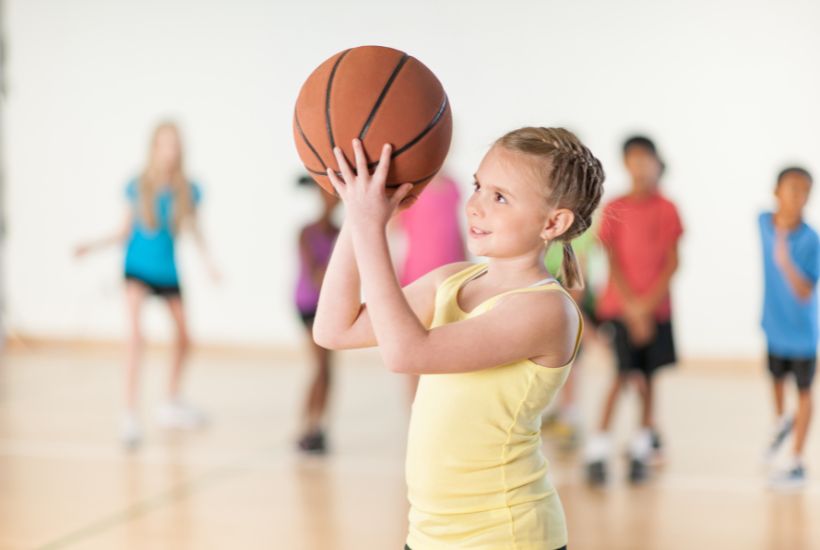Executive functioning activities for each age
Why am I talking about executive functioning activities? Well! Executive functioning skills are important for success in life. They help us with problem-solving, organizing, and completing tasks.
Executive functioning skills can be improved through practice and involvement in fun activities!
Executive function is a term used to describe the cognitive skills that allow us to plan, focus, and stay on task.
This blog post will provide ideas for executive functioning activities for each age group: infants and toddlers, preschoolers, school-aged children, and teenagers.
We encourage you to try out these activities with your child and see which ones work best for them!
Executive functioning activities for infants and toddlers
Ages 6 months to 18 months
Although the ability to perform executive functions does not exist at birth, it is something they can acquire.
Although it matures throughout adulthood, most experts believe that ages 0-5 are important for establishing its foundation.
This period in your child’s life is when her brain is molded by his experiences, making this time in her life extremely important.
Ages 19 months to 36 months
At this age, your child’s executive functioning starts to form. However, they are still minimal.
During this time, your child is beginning to understand the concept of time and can start following simple commands such as ” put your shoes on.”
You can help your child improve their executive functioning skills by doing activities such as puzzles, building towers with blocks, and singing songs that involve counting.
What does executive functioning look like for infants and toddlers?
During the first few months of life, executive functioning appears in a very basic form.
For example, an infant might be able to follow a moving object with her eyes or turn her head when she hears a loud noise.
As she grows older, she will develop more complex executive functioning skills, such as remembering where she put her toy or imitating the actions of others.
Executive functioning activities for infants and toddlers:
Clap games:
Games like “Pat-a-cake” or “This Little Piggy” are great for developing executive functioning skills in infants and toddlers.
They help with eye-hand coordination, memory, and motor planning.
Puzzles:
Simple puzzles with large pieces are perfect for this age group. They help with problem-solving, spatial awareness, and fine motor skills.
Shape sorters:
This is another excellent activity for developing executive functioning skills in infants and toddlers. It helps with problem-solving, color recognition, and fine motor skills.
Block towers:
Building towers with blocks helps with visual-spatial skills, problem-solving, and motor planning.
Hiding games:
Games like “peek-a-boo” or “where’s the teddy bear?” help with object permanence, memory, and attention.
Encourage your child to do the same and see how long you can keep the game going.

Follow-up game:
This is a great game to play with your infant to help her develop her ability to track moving objects.
To play, simply hold up an object and move it around in front of your baby.
Encourage her to follow the object with her eyes and see how long she can keep track of it.
Imitation game:
This is a fun game that helps your infant develop his ability to imitate actions.
To play, simply show your baby how to do a simple action such as clapping or waving.
Then, encourage him to imitate your action.
See how many different actions he can imitate, and have fun watching him learn!
Memory game:
This is a great game to help your infant develop his memory skills.
To play, hide a toy in plain sight and then let your baby find it.
Encourage him to remember where you hid the toy and see if he can find it again.

Singing and dancing:
Singing is a great way to help your infant or toddler develop executive functioning skills.
Songs with simple actions help with motor planning and memory.
Songs with counting help with number recognition and executive functioning skills.
You can even add some simple dance moves to help your child learn while he’s having fun!
Find some of your favorite songs and sing them together!
Storytelling:
Reading books is a great way to help your child develop executive functioning skills.
Books with repetitive phrases help with memory and language skills.
Books with simple plots help with attention and problem-solving skills.
Take some time to read together every day!
Finger puppets:
Finger puppets are a great way to help your child develop executive functioning skills.
They help with motor planning, fine motor skills, and imagination.
You can use finger puppets to act out stories, sing songs, or have fun!
Make up your own stories or find some of your favorites to share together.
These are just a few executive functioning activities that you can do with your infant or toddler.
Sensory activities:
Sensory activities are also great for helping your child develop executive functioning skills.
Activities like playing in a sandbox, finger painting, or playing with dough help with motor planning, fine motor skills, and sensory processing.
Find some of your child’s favorite sensory activities and have fun together!
Executive functioning activities for preschoolers
Ages 3 to 5 years
During this stage, executive functioning skills begin to emerge more clearly.
Between the ages of 3 and 5, executive function develops exponentially.
Children at this age can follow complex commands, remember information for short periods, and begin to plan ahead.
They are also beginning to understand the concept of time and how it works.
Here are some executive functioning activities for preschoolers:
What does executive functioning look like for preschoolers?
Preschool kids can draw on their working memory and attention skills to accomplish small goals, such as dressing themselves, picking up toys, or setting the table for dinner, though they may need help.
They can also follow simple rules and routines, such as brushing their teeth before bed or getting dressed for school in the morning.
As they get older, they will be able to follow more complex rules and routines, such as getting ready for a playdate or packing their backpack for a field trip.
Executive functioning activities for preschoolers:
Pretend Play:
Pretend play is an excellent way for preschoolers to practice executive functioning skills.
They can pretend to be different characters, such as a doctor, a firefighter, or a mommy.
This type of play helps with imagination, problem-solving, and motor planning.
Make-believe games:
Make-believe games are another excellent way for preschoolers to practice executive functioning skills.
In these games, they can take on different roles and use their imaginations to create different scenarios.
This type of play helps with problem-solving, creativity, and social skills.
Block Play:
Block play is a great way for preschoolers to practice executive functioning skills.
Building with blocks helps with visual-spatial skills, problem-solving, and motor planning.
It also helps with math skills, such as counting and identifying shapes.
Games:
Games like “Simon says,” “memory,” and “hide-and-seek” are great for executive functioning skills.
These games help with attention, working memory, and motor planning.
They also help with social skills, such as turn-taking and following rules.

Crafts:
Crafts are a great way for preschoolers to practice executive functioning skills. It can help with fine motor skills, visual-spatial skills, and attention.
They also help with problem-solving, as children have to figure out how to make the craft using the materials provided.
Storytelling:
Storytelling is a great way for preschoolers to practice executive functioning skills.
Telling stories helps with language skills, attention, and working memory.
It also helps with problem-solving, as children have to develop a story using the materials provided.
Music:
Listening to music and singing along is a great way for preschoolers to practice executive functioning skills.
Music helps with attention, working memory, and motor planning.
It also helps with language skills, as children have to follow along with the lyrics.
Movement:
Moving your body to the beat is a great way for preschoolers to practice executive functioning skills.
Movement helps with gross motor skills, attention, and motor planning.
It also helps with social skills, as children have to follow the movements.
Construction play:
Construction play is a great way for preschoolers to practice executive functioning skills. It helps with visual-spatial skills, problem-solving, and motor planning.
It also helps with math skills, as children have to figure out how to put the pieces together.

Experimentation:
Experimenting with different materials is a great way for preschoolers to practice executive functioning skills.
Science experiments help with attention, working memory, and problem-solving.
They also help with fine motor skills, as children use small tools to conduct the experiment.
Following instructions to make a craft or cook a simple recipe is another great way to practice executive functioning skills.
This activity helps with attention, working memory, and motor planning.
It also helps with language skills, as children have to follow the instructions to make the craft or recipe.
Experimentation helps with attention, problem-solving, and creativity.
It also helps with fine motor skills, as children have to manipulate the materials.
Water play:
Water play is a great way for preschoolers to practice executive functioning skills. It helps with attention, problem-solving, and motor planning.
It also helps with social skills, as children have to take turns with the water hose or bucket.
Executive functioning activities for school-aged children:
Ages 6 to 12 years
During this stage, executive functioning skills become more refined.
As children get older, planning abilities help us comprehend more complex instructions and follow steps toward achievement from age two to age twelve.
Children at this age can remember information for long periods of time, plan ahead, and juggle multiple tasks at once.
They are also beginning to understand the concept of time and how it works.
What does executive functioning look like for school-aged children?
- Finish their homework
- Remember to bring their lunch to school and pack their backpack the night before a field trip.
- Can follow checklists and routines for things like getting ready for bed or taking a shower.
- Able to manage unpredictable changes in schedules or plans.
- Stay on task for 30-50 minutes
- Can understand other people’s emotions like empathy.
- Start developing habits like showering, packing their own backpack, and getting dressed independently.
- Understand a school schedule and prepare for it accordingly
- Inhibition of impulses like raising their hands at school or waiting in line at the store.
Executive functioning activities for school-aged children:
Card games and board games:
Card games and board games like Go Fish and Monopoly are great executive functioning activities for school-aged children.
Playing card games and board games can help improve executive functioning skills in school-aged children. These games help with attention, working memory, and problem-solving. They also help with motor skills, as children have to move pieces around or follow directions on a card.
Organized sports:
Whether a team sport or an individual sport, organized sport can help improve executive functioning skills in school-aged children. These activities help with attention, working memory, and motor planning. They also help with social skills, as children have to communicate with teammates or follow the rules.

Outdoor activities:
Doing outdoor activities can help improve executive functioning skills in school-aged children. These activities help with attention, problem-solving, and motor planning. They also help with social skills, as children interact with other people and the environment.
Music, singing, and dance games:
Learning a song or a dance choreography can help improve executive functioning skills in school-aged children. These activities help with attention, working memory, and motor planning. They also help with language skills, as children have to remember the words or the steps.
Brain teasers:
Brain teasers like puzzles and riddles can help improve executive functioning skills in school-aged children. These activities help with attention, problem-solving, and logic. They also help with logic and reasoning, as children have to think critically to solve the puzzles.
Contributing to the homes:
Helping out around the house can help improve executive functioning skills in school-aged children. These activities help with attention, problem-solving, and motor planning. They also help with responsibility, as children have to take care of their belongings and do their chores.
There are a lot of chores that a child can do between the ages of 6 and 12 years, such as:
- Washing the dishes
- Vacuuming the floor
- Taking out the trash
- Setting the table for dinner
- Folding laundry
- Watering the plants
- Feeding the pets
- Making a simple meal:
Meditation and yoga:
Meditation and yoga are great executive functioning activities for school-aged children. These activities help with attention, working memory, and motor planning.
They also help with focus, as children have to concentrate on their breath or the movement.
It can also help a child learn how to regulate emotion and manage stress.
STEM Games:
STEM toys and games can help improve executive functioning skills in school-aged children. These activities help with attention, working memory, and problem-solving. They also help with logic and reasoning, as children have to think critically to solve the puzzles.
Some stem games that school-aged children can play are:
- The Maze game
- The Tower of Hanoi
- LEGO Chain Reactions
- STEM Kit with Metal Body Microscope
- Rubik’s Cube
- Jenga
- Tic-tac-toe
Executive functioning activities for Teenagers
Ages 13 to 19 years
During this stage, executive functioning skills continue to develop and mature.
As a teenager, your executive functioning skills are probably pretty good. But they can continuously be improved!
What does executive functioning look like for Teenagers?
Teenagers can:
- Plan and organize their time by making a schedule
- Keep track of their belongings like their phone and keys
- Handle stress and emotions by talking to a friend or going for a run.
- Think about the future like planning for college
- Set goals and achieve them, goals like getting a job or saving money
- Some executive functioning activities for teenagers are:
- Think abstractly like playing chess
- Make decisions like choosing what to wear
- See the consequences of their actions
- Understand other people’s points of view
- Control their impulses like not texting while driving
- Handle frustration by taking a deep breath
Executive functioning activities for Teenagers:
Making a budget:
Help your child make a budget for their allowance or spending money. This will help them understand how to save money and choose what to spend their money on.
Making a budget can help improve executive functioning skills in teenagers. This activity helps with planning and organization, as teens have to track their spending and save up for their goals. It also helps with responsibility, as teens have to be mindful of their spending.
Creating a resume:
Help your child create a resume. This will help them understand how to present themselves to potential employers and what skills they offer.
Creating a resume can help improve executive functioning skills in teenagers. This activity helps with planning and organization, as teens have to gather their information and format it in a way that is easy to read. It also helps with logic and reasoning, as teens have to think about their skills and how they can best sell themselves to potential employers.
Packing for a trip:
Help your child pack for a trip. This will help them understand how to plan ahead and pack efficiently.
Packing for a trip can help improve executive functioning skills in teenagers. This activity helps with planning and organization, as teens have to think about what they will need and how to fit it all into their suitcase. It also helps with logic and reasoning, as teens have to figure out the best way to pack their belongings.
Paying bills:
Help your child pay bills. This will help them understand how to budget their money and make choices about spending.
Paying bills can help improve executive functioning skills in teenagers. In addition, this activity helps with planning and organization, as teens have to track their spending and make sure they have enough money to cover their expenses. It also helps with responsibility, as teens have to be mindful of their bills and pay them on time.

Shopping:
Help your child go shopping. This will help them understand how to choose what to buy and how to budget their money.
Shopping can help improve executive functioning skills in teenagers. This activity helps with planning and organization, as teens have to think about what they need and how much it will cost. It also helps with logic and reasoning, as teens have to compare prices and find the best deals.
Shopping also helps with executive functioning skills in teenagers by teaching them how to budget their money. This activity requires planning and organization and logic and reasoning to find the best deals on items. It also helps with responsibility, as teens have to be mindful of their spending.
Cooking:
Help your child cook. This will help them understand how to follow a recipe and measure ingredients.
Cooking can help improve executive functioning skills in teenagers. This activity helps with planning and organization, as teens have to gather their ingredients and follow the recipe. It also helps with logic and reasoning, as teens have to figure out the measurements for each ingredient.
Doing laundry:
Help your child do laundry. This will help them understand how to sort clothes and use the washing machine.
Doing laundry can help improve executive functioning skills in teenagers. This activity helps with planning and organization, as teens have to sort their clothes and match them up with the correct settings on the washing machine. It also helps with logic and reasoning, as teens have to figure out how much detergent to use and how long to set the timer for.
Using a planner:
Help your child use a planner. This will help them understand how to keep track of their schedule and plan for upcoming events.
Using a planner can help improve executive functioning skills in teenagers. This activity helps with planning and organization, as teens have to write down their classes, homework assignments, and extracurricular activities. It also helps with time management, as teens have to figure out balancing their schoolwork with their other commitments.
Getting a Job:
Encourage your child to get a job. This will help them understand how to manage their time and money and develop a sense of responsibility.
Getting a job can help improve executive functioning skills in teenagers. This activity helps with time management, as teens have to juggle their work schedule with their school schedule.
It also helps with responsibility, as teens have to show up on time and do their job well.
It also helps with money management, as teens have to budget their earnings and make sure they are spending wisely.
To sum things up
These are just a few executive functioning activities that can help your child improve their skills. Many other activities can also be beneficial.
The important thing is to find activities that your child enjoys that will help them in the areas they struggle with the most.
Then, with a little bit of effort, you can help your child develop strong executive functioning skills that will benefit them throughout their life.
Thanks for reading!







